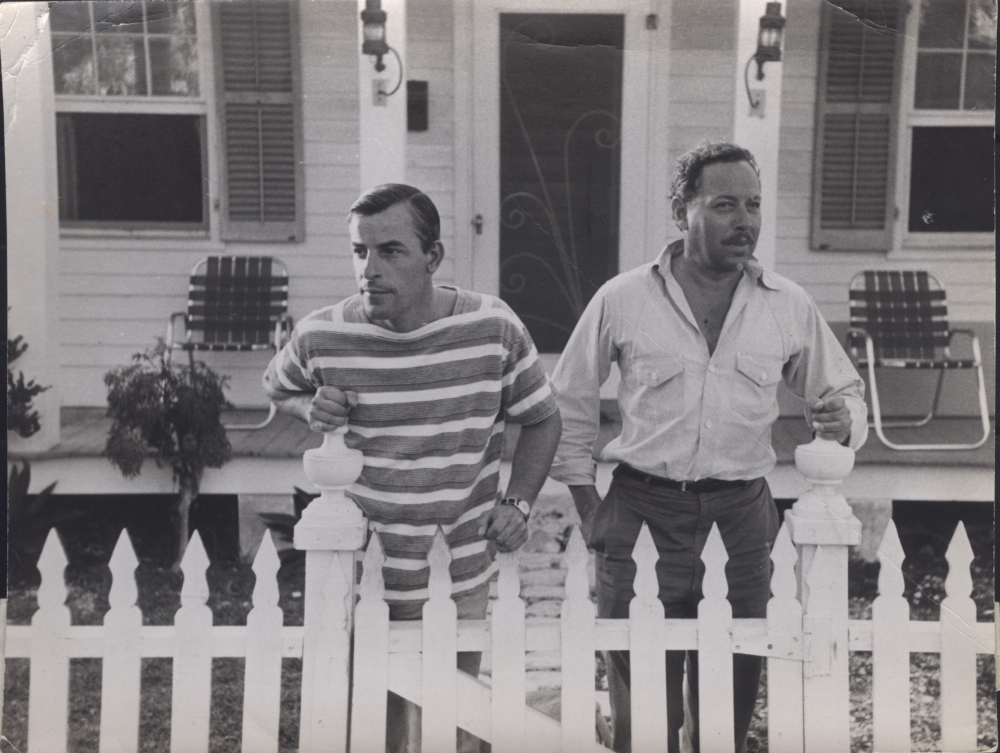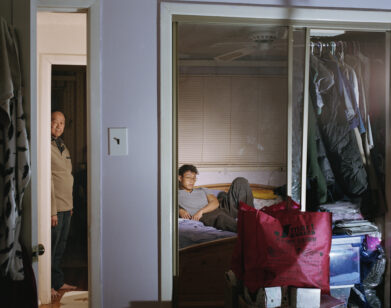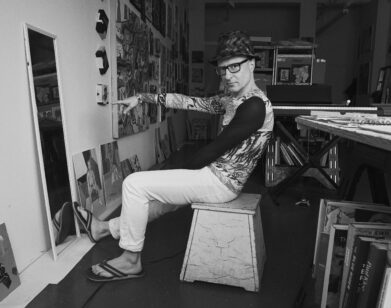In His New Novel on a Literary Light, Author Christopher Castellani Opts for the Shadows

Tennessee Williams and Frank Merlo at the Key West House. Courtesy the Mississippi Library Commission.
“For stars to remember you, you had to have been of some use to them.” This revelation arrives toward the end of Christopher Castellani’s gorgeous and sweeping new novel, Leading Men, about the famous playwright Tennessee Williams and his handsome, obscure boyfriend Frank Merlo as they travel around Italy in the summer of 1953. It is one of many telling observations about the nature of fame, true love, and the imbalance of power between a celebrated genius and his relatively unknown companion that resonate through this sumptuous work of historical fiction. But rather than grabbing the gilded reigns of Tennessee Williams to guide the reader, Castellani chooses the man in the shadows, Frank, as the heart and soul of the book. It is under the heavy shade of Frank’s unquestionable love for Williams and his complicated, dwarfed ambition to be a somebody of consequence in his own right, that we move through the social swirl of Portofino, and into the lives of the real (Truman Capote, Anna Magnani, Luchiano Visconti) and the invented (Castellani creates an aspiring young actress named Anja Blomgren to join the party and, decades later, to bring a fictitious lost Williams play to the stage in memory of her dear friend, Frank). The author describes the sights, sounds, cruising zones, and violent surprises of 1950s Italy so deftly, the novel could stand in for a vacation; but also manages to capture the lightning of these massive artistic figures on the page with such force, it does feel as if you have tiptoed around Williams’s desk in Rome while he was busy writing a masterpiece. This past February, Castellani spoke with Interview about reinventing Williams and his world and leading the little known Frank into the light of day.
———
CHRISTOPHER BOLLEN: Why did you choose to write about Tennessee Williams and his boyfriend Merlo Merlo in the Italian summer of 1953. It’s such an enticing subject. How hard was it to recreate such a larger-than-life character as Tennessee Williams?
CHRISTOPHER CASTELLANI: The novel grew out of a short story that I wrote in the late 1990s in my MFA program. It was told from Williams’s point of view. That short story didn’t really work in the end, but there was something there that I wanted to blow up. I very vividly remember being in a bookstore in Delaware and coming across this Williams memoir and reading about a guy named Frank Merlo. He was this Italian-American gay working class dude from Jersey, who was the partner of Tennessee Williams. And here I am, a gay Italian-American working class dude from Delaware, and I identified with him. I also identified with the fact that he was in these elite circles with all these literati socialites and probably struggling to find his place in the world. I, myself, was the only one in my immediate family to finish college. In this ivory tower, I always felt like a bit of an imposter. So it was really more about Merlo, and what it was like to live in Williams’s shadow. Merlo was literally in the shadows, making all the arrangements behind the scenes, booking tickets, ironing Tennessee’s shirts, taking care of the bills, all that kind of stuff.
BOLLEN: It’s a classic but often unexamined relationship — the one in the world’s spotlight and the one waiting quietly off stage. Like the great Auden poem “Who’s Who” with the hero climbing mountains and naming seas, but pining for the one who stays home pottering around the garden.
CASTELLANI: Usually, the story is of the wife behind the man. I was interested in the man behind the man.
BOLLEN: There’s no end of material on Williams’s life, but I imagine there is very little on Merlo to draw from.
CASTELLANI: I deliberately did not contact whoever’s left of his family. I wanted the character to be my interpretation. It’s not a biography. It’s my interpretation based on what I know from the letters that Williams wrote, along with the letters that people wrote to Williams about Merlo. Including what I’ve seen in photos, and a little bit of primary material.
BOLLEN: There was a show last year at the Morgan Library on Williams, and what struck me about that show was that Williams was not only a genius writer when it came to his literary work, he was bursting with personality in his letters and diaries and notes. It seems daunting to try to write fictional dialogue in his voice. And not only that, you also had to conjure other great wits like Truman Capote from time to time.
CASTELLANI: It was intimidating to live up to their dialogue, their intellect, their sharpness, their wit. I could never do them justice, but again, in the book I don’t really have to get in their head like I do with the interiority of Merlo’s or Anja’s character. Williams’s journals were an absolute treasure trove. They were very naked, very raw, totally unmediated. It’s not like his memoirs or his letters, where he was performing. I took a lot of dialogue directly from them. Some of the things he says to Merlo in the book are things that he said about Merlo in his journals. It was a way of getting the authenticity — certainly not everything, but enough scraps here and there to anchor the dialogue and give me confidence.
BOLLEN: You choose to set in the book in a particular week of the summer of 1953 because there is an empty space in Williams’s journals when he and Merlo are living in Rome. This meeting of so many characters in Portofino could have happened — as Truman was indeed throwing a party there. As a fiction writer, even as a historical fiction writer, how important is to you that they events could have possibly happened?
CASTELLANI: Every writer who writes in this genre sets different rules for what they want to do. People are writing about Abraham Lincoln fighting vampires. That obviously didn’t happen — at least I don’t think. But for me, yes, it was important that everything in this book could have happened. There’s no evidence that it did, but I mapped out very carefully where everyone was, what they were doing, and who they were with. I wrote in the cracks of what we knew. My publisher, Viking, was great because they hired a Tennessee Williams scholar — who was someone I had already consulted — to go through the book and see if I got stuff right.
BOLLEN: Were there any moments where you got something “wrong” but you said, “I don’t care, I love this too much to lose it”?
CASTELLANI: Not to toot my own horn, but I got like 98 percent of it right. There was one scene where I have Williams trashing another playwright in the scene when he meets Anja for lunch at the Waldorf Hotel. I have him really trashing the writer, and the scholar said, “He wouldn’t even use expletives to attack her, even at that stage in his life.” So, I was willing to tone the dialogue down. Also, that made me feel so much more confident with the book going out. I had at least this one dude who read it, and who felt like it was accurate enough for what I wanted to do.
BOLLEN: What about getting the more emotional or psychological details accurate? Williams basically abandoned Merlo as he sat dying of lung cancer at the age of 42 in a hospital in New York.
CASTELLANI: That’s very well documented.
BOLLEN: But you do include a scene of their reunion. Writing someone’s last moments with the love of their life—especially a relationship so fraught—seems difficult to navigate.
CASTELLANI: Merlo definitely felt abandoned, because he was abandoned. but Williams did eventually visit him on the day he died. Merlo was clearly was holding out for him. It’s very moving. They had been estranged. By the end, they were very poisonous to each other, but Merlo was also hiding his illness to a degree. So, Williams knew but didn’t know what was going on, and he was angry at Merlo for withholding this information. There was all of this terrible stuff between them, and all the ways that partners can hurt each other. To give Williams the most credit, you can say that he really didn’t believe that this was going be the end, because they had called it the end many times before. But Truman Capote really did tell Merlo, “Tenn’s not coming because he thinks you’re contagious.” Williams was such a hypochondriac, that whether or not he really believed he was contagious, it was just the idea, that energy. Who knows? But anyway, he did finally come.
BOLLEN: A lot of people, a lot of famous artists in particular, can’t handle sickness and death. There are a lot of stories of people like Warhol, for example, who seemed abandon friends in their decline. It was a fear of their own mortality, I suppose. But you paint a very beautiful final scene between them.
CASTELLANI: He did come to visit on the last day, but what happened between them in my book—going down to the park and rolling Merlo around—is entirely made up. But it’s also very well documented that the last words that Merlo said to Williams were, “I’m used to you.” And that Merlo still never said he loved him. Williams has written a lot about the “I’m used to you” line. And I wanted Merlo, because I’m taking or using or telling his story—whatever you want to call it — I wanted Merlo to have the last line. Williams wrote a beautiful unpublished poem about it called “The Final Day of Your Life.” It’s absolutely devastating. It was very useful, in terms of me understanding his relationship in that moment. It describes the hospital room and finding out when he died later that night.
BOLLEN: I have to ask about the backdrop, because you describe Portofino and that era of true jet-set Italian vacationing so wonderfully. Surely you could have picked other missing weeks in Williams’ journals—a rainy February in New York, for example. But Italy must have been a major temptation.
CASTELLANI: Absolutely. Believe it or not, my original impulse was to write a happy love story. I knew Merlo was going to die, but I thought the book was going to be somewhat happier. I had read that Williams and Merlo spent their happiest years together in Italy. So I did think, “Oh, I’m going to write a book about their happy times in Italy.” I’ve also written other books set in Italy. My family is from Italy. But as I dug into that summer, I realized that it was tempestuous and I knew it wasn’t exactly happy for Merlo and Williams. If I wanted to be true to them, I had to write about their tensions.” There are obviously some happy moments in there between them, but overall, it’s not exactly like a happy romp through the beach.
BOLLEN: Did you go to Portofino for research?
CASTELLANI: Yes, just on a day trip. I saw the hotel. I saw Truman’s apartment. It was above the Delfino restaurant, which is the first restaurant you see when you come off the dock. There are gorgeous yachts everywhere. Of course it’s very different from the way it was in the 1950s. It’s awfully touristy now. I’m sure if you have money there are still little enclaves, but its not like it was in 1953.
BOLLEN: The world was so much harder to get to then, that if you managed to arrive you had an open invitation to the scene.
CASTELLANI: That’s true, yeah. You just sort of wandered in where people were having these parties. Writing those parts was just pure fun. I wrote the heart of the book after the 2016 election and it was such a refuge from the country. I wanted t be in Portofino with these people and not in the United States at that time.
BOLLEN: Were you writing most of it in Boston?
CASTELLANI: In Boston and in Provincetown, where I have a little place, which is why Provincetown found its way into the book, because that’s where Merlo and Williams met. They met on the porch of the Atlantic House bar. I would literally walk by it every day, doing a little pilgrimage. There’s a great picture of Williams naked on the beach in the bar. It felt awesome.
BOLLEN: Did your understanding of Tennessee Williams change in writing this book? Inhabiting that world, did you come out of it with a different take on him?
CASTELLANI: The main goal was to bring Merlo into the light. I just wanted him to have his due. I wanted him to have a place. I really, really, really did not want to pass judgment on how Williams treated him, because it’s not my place to do so. People have their own feelings about the portrayal. Some people who read it were like, “God, Tennessee was such an asshole.” But this is Merlo’s side of the story. The only way you can judge Williams is through the way I created Merlo’s judgment of him. I have no judgment of Williams at all.






